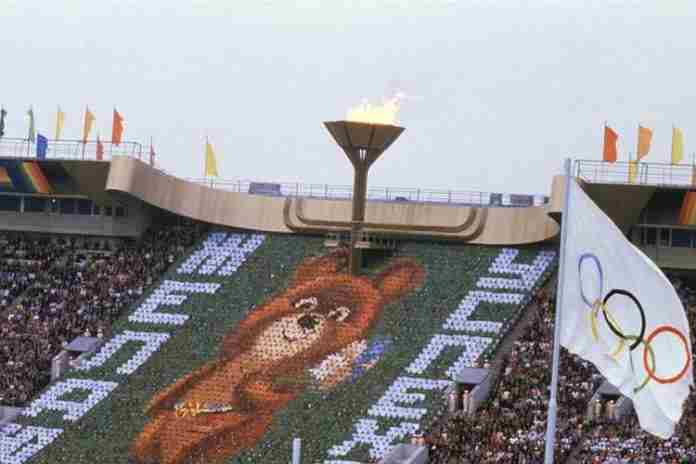(★ Friends: Very grateful to have received 34 donations over the past month toward our server and support costs, covering about 70% of our current bill. But we could use your help to cover the rest; if you wish, please donate here. Thank you. ★)
A story from Japan’s Kyodo News Service summed up the current situation for the Games of the XXXII Olympiad: Tokyo 2020 perfectly:
“[I]t seems that nothing more than a wait-and-see approach can be taken, at least for now.”
But that hasn’t stopped lots of people from talking, some of whom are worth listening to:
● The head of the Tokyo organizing committee, Yoshiro Mori – a former Prime Minister of Japan from 2000-01 – is fully aware of the issues, but also knows that the 2020 Games have a role to play in history:
“There are many things that should be fixed in Olympic operations. Even if we can’t realize it this time, it will help next time. I hope senior IOC officials will say the Tokyo Games have been a turning point for streamlining the Olympics.
“I feel they should continuously review what parts are necessary, remove a sport when a new one is introduced, or not selecting sports that require a new venue costing 30 billion to 50 billion yen ($28 to $47 million).”
He is also concerned not only with having spectators as part of the Games, but also with giving athletes the best possible Olympic experience. For example, as to ceremonies:
“If athletes have the strong will to take part (in ceremonies), we can’t tell them things from our side. (The parade) also uplifts spectators. Doing away with it is not an option.”
● The Tokyo organizers also had the problem of how to operate the Games in a “hands-off” manner, completely contrary to the pre-COVID-19 planning. A Kyodo story noted:
“Up to 28,000 journalists and technical staff have been accredited for the Olympic Games, and with the scale of media coverage varying widely between countries, outlets and sports, there is not going to be a one-size-fits-all way to manage athlete interviews.
“The organizing committee had hoped to recruit some 80,000 volunteers as well as cleaners, sales vendors and security guards but now, an organizing committee staffer said, ‘We will have to keep physical contact with athletes to a minimum.’
“Prof. Hiroyuki Kunishima, an infectious diseases expert at St. Marianna University School of Medicine in Kawasaki, said, ‘Pro baseball and J-League will serve as a test case.’”
● On the costs issue, the Tokyo organizers are also beginning meetings with their domestic sponsors, asking for more money.
Both the organizers and sponsors are in a tough spot. While the organizers need more money, sponsors have (1) already pitched in billions to support the Games, (2) are in financial peril themselves due to the coronavirus pandemic, but (3) won’t get the full impact of their sponsorship without continuing – at an additional cost – through 2021. But that decision has to be weighed against (4) the likelihood that the Games won’t happen at all, or that (5) it will take place on a reduced basis that will not generate the enthusiasm for their sponsorship that was expected.
It’s almost a no-win situation. What happens? Sponsors could chart a middle course by opting to provide some additional support, and hope for the best.
● Canada’s Dick Pound, the senior member of the International Olympic Committee told Kyodo:
“I think the principle that made the Olympic Games such a worldwide celebration still exists (and) the idea of international competition in various sports is still of interest. I think people recognize the Olympics are special.
“The concept has a universal appeal and therefore people motivated by solidarity will find a way to make it work.”
He emphasized that the Tokyo Games must be held in 2021 if at all, and that the idea of allowing only Japanese spectators at the Games really doesn’t work either:
“I think that will not be the Olympics in a sense that we understand them. We don’t know what the travel restrictions will be (in 2021), whether there are some countries that may not be permitted to travel, or permitted to enter Japan. That needs to be decided on the basis of scientific assessment of the risk on a country-by-country basis.”
At present, Japan has travel/quarantine restrictions on visitors from 129 (!) countries.
He also expanded on his comment from last week that if the Tokyo Games are not held in 2021, the Beijing Winter Games in 2022 could also be at risk:
“The political, boycott aspect about it is more problematic, in a sense that nobody knows how that develops over time. We had, back in 2008, there were many, many calls to boycott because of China’s human rights record, and in the end there was no concerted boycott. Maybe this time the situation is more serious.”
¶
The situation in Tokyo and the existing pressure being exerted on the cost of the Games by the International Olympic Committee is being felt elsewhere, especially in Paris, the site of the 2024 Games.
As part of its report to the IOC Session last week, organizers confirmed a substantial change, reducing the size of the to-be-built Olympic Village by 16%:
“Thanks to the work in consultation with 18 NOCs, the size of the village has been optimised by reducing the total capacity to 14,250 beds. Land developers have been selected for all the village lots. Cleaning and demolition works, launched at the end of 2019, are gaining speed so that village construction can start in 2021 for a completion by the end of 2023, as planned.”
That will save millions. It will be fascinating to see whether the IOC will encourage further savings by extending its concept of housing athletes in “waves,” as proposed for the 2022 Youth Olympic Games in Dakar (SEN), now to be held in 2026. That could bring the needs for the Olympic Village down to perhaps 10,000 beds, an even more manageable project.
The Paris organizers also have the idea to hire existing organizations to run their competitions where possible, aiming for possible savings in staff. The most obvious candidates would be the management teams for the Tour de France for the road cycling races and the French Open for tennis, but who knows whether they would cost the organizing more or less than an in-house team. The Paris report noted the goal “of optimising the Games delivery model by maximising the use of existing expertise in the organisation of sport events, in France and within the Olympic and Paralympic movement.
“In this context, all the International Federations have been consulted regarding the involvement they would like to have in the delivery of their sport during the Paris 2024 Games.”
Those answers would be fascinating to read!
¶
A sad note, on the passing of Russian illustrator Viktor Chizhikov, 84, who created the memorable “Misha” mascot for the 1980 Olympic Games in Moscow.
Reuters reported that more than 60 different candidates for the Moscow mascot were submitted, but Misha was selected.
Although the Moscow Games was hit by the U.S.-led boycott, there was unanimous praise for the mascot, a smiling bear wearing a belt in the Olympic colors. It adorned countless souvenirs, especially pins of every kind, and was part of the amazing card stunts used in both the opening and closing ceremonies of the Games.

























